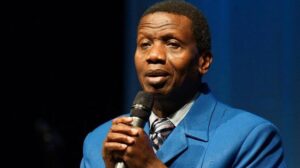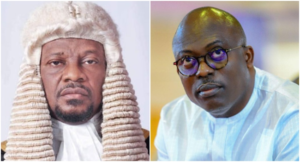The Senate recently asked the Acting President Yemi Osibanjo to transmit the 2014 National Constitutional Conference Report to it as a bill for consideration.
The request was preceded by a motion sponsored by Sen. Ahmed Lawan (APC-Yobe) entitled: “The need for National Unity and Peaceful Co-existence in Nigeria,’’ co-sponsored by 106 other senators.
Lawan’s motion had four prayers, but there was an additional prayer by Sen. Mao Ohuabunwa (PDP- Abia North), that the Federal Government should be urged to urgently forward the report to the National Assembly for deliberation.
The 2014 National Constitutional Conference headed by Justice Idris Kutigi recommended inter alia, the creation of 18 new states; three per geo-political zone.
The recommended states are Apa, Edu, Kainji, Katagum, Savannah, Amana, Gurara, Ghari, Etiti, Aba, Adada, Njaba-Anim, Anioma, Orashi, Ogoja, Ijebu and New Oyo.
Aside the 18 proposed states, the conference recommended one new state for the South East to make the zone have equal number of states with the other zones except the North West which has seven states with a note that states willing to merge can do so on condition.
It recommended further that the sharing of the funds to the Federation Account among the three tiers of government should be Federal Government; 42.5 per cent, state governments; 35 per cent and local governments; 22.5 per cent.
On forms of government, it recommended Modified Presidential System; a home-made model of government that effectively combines the presidential and parliamentary systems of government.
It also suggested a bi-cameral legislature, in which all elected members of the legislative arms of all the tiers of government should serve on part-time basis, among other recommendations.
Ohuabunwa’s motion was seconded by Sen. Adeola Solomon Olamilekan (APC, Lagos West) and was unanimously adopted by the senators.
In agreement with the motion, Sen. Adamu Aliero (APC- Kebbi Central) said that there was need to deliberate on the report and implement the necessary recommendations.
Although some perceptive Nigerians are of the view that the conference report should be looked into for political development, others believe that revisiting it is uncalled for.
For instance, the Yoruba Council of Elders (YCE) at the wake of a meeting of the Elders’ Council expressed its support to the Senate in that regard.
The President-General of the council, Dr. Kunle Olajide said “the YCE commends the Senate for its resolution.
“We urge the executive to forward the report of the 2014 National Conference to the National Assembly as an executive bill.
“The YCE urges all Nigerians to support the initiative of the National Assembly in its decision to work on the report.
“The YCE also commends the efforts of the Acting President Yemi Osinbajo in holding consultation with the leaders and elders of the six zones of the country. We assure him of our support,’’ he said in a communiqué.
Sharing similar sentiments, a rights group, the Committee for the Defence of Human Rights said urgent implementation of the report was cardinal to addressing the socio-economic and political problems confronting the nation.
The chairman of the group, Mr Emeka Anosike decried the delay in implementing the conference report, saying that the group was in support of the current call by groups and notable Nigerians to implement it.
According to him, the current call and agitation by Nigerians from all works of life and ethnic backgrounds for the implementation of the report showed that the people are united on the call.
He said the document provided answers and solutions to the problems affecting the country since independence.
“We as a rights group have been privileged to peruse critically through the document; I want to say without any equivocation that the report is a masterpiece and has provided answers and solutions to our problems as a country and as a people.
“We believe in the continued existence of Nigeria as one indivisible entity and we are also opposed to any violent disintegration hence the need to implement the report of the conference which undoubtedly has clearly provided the basis for this unity.
“What we are saying is that the implementation of the report is very strategic in addressing the rising ethnic agitations, separatist calls, clamour for resource control and power sharing, among others.
“The Federal Government should begin the process of making this document to become part of our law by presenting it before the National Assembly as an executive bill so that legislative action can commence on it,’’ Anosike said.
In the same vein, former Minister of Information, Jerry Gana recently called on the Federal Government to implement the recommendations of the conference.
“In 2014, we gathered a very huge conference and over 600 recommendations were generated by consensus. Even if it is just 10 per cent of that was implemented, we are going somewhere.
“It is important that the Federal Government takes a look at the major recommendations of that conference with a view to examining them and implementing those that will help us to move forward,’’ he said.
Irrespective of this, the Arewa Liberation Movement says the implementation of the conference recommendations may not bring any benefits after all.
The group said in a statement issued by its National President Usman Usaman and its National Secretary Kabir Alfa that the outcome of the conference was drafted to favour a particular interest.
“Our members are of the opinion that the last national conference was convened in the interest of a few rather than all.
“We therefore recommend a more sincere and all inclusive national conference,’’ the group said in the statement.
The statement, nonetheless, restated that it neither supported nor encouraged violence for the attainment of whatever political goals or aspirations desired by any group of people.
By and large, observers note that if the purpose of revisiting the conference recommendation is for the unity and development of the country which will as well douse tension in the polity, so be it. (NAN)







